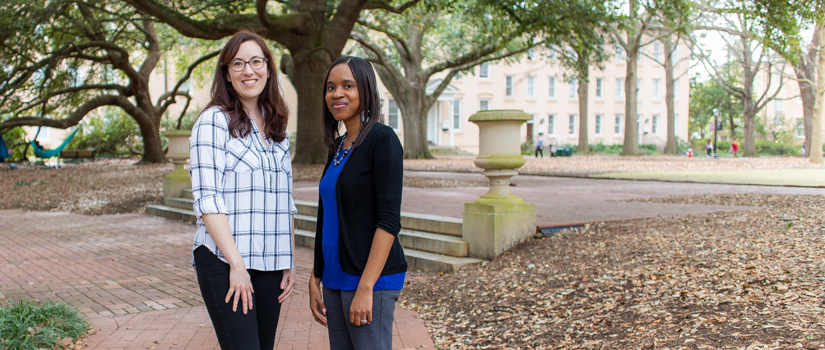Feb. 13, 2020
Chris Woodley • cwoodley@mailbox.sc.edu
Ph.D. candidates Brittany Davis and Mariah Moran were two of the 57 recipients of the Support to Promote Advancement of Research and Creativity Graduate Research Grants. Both candidates worked with a faculty advisor to prepare and submit proposals and grant applications.
Sponsored by the Office of the Vice President for Research, SPARC Graduate Research Grants are merit-based awards designed to promote research and creative excellence across all disciplines at the University of South Carolina. The SPARC program provides up to $5,000 for eligible students to support their research, creative or other scholarly projects.
Davis worked with Kirk Foster, Associate Dean for Diversity, Equity and Inclusion, to prepare a proposal for her research, “Community Land Trusts: Inclusion and Maintaining a Sense of Community.”
“Dr. Foster provided valuable feedback and helped to ensure that my proposal was in good shape,” Davis says. “I value his expertise in community-engaged research, particularly with communities of color. He will be a great resource as I continue to move forward with my research.”
According to Davis, previous research has shown that gentrification may lead residents in low-income African American communities to feel excluded from community development processes. Empirical evidence also suggests that gentrification may lead to social and cultural displacement of African American residents. Community Land Trusts, which were developed during the Civil Rights Movement, have been identified as a more equitable form of redevelopment. Residents can voice their development preferences, be a part of development decision-making, and maintain collective ownership of land. However, not all residents choose to be a part of CLTs. She intends to partner with a local community land trust and use the research findings to help inform their community development strategies.
“Given African Americans’ history of marginalization in the U.S., it is important to identify community development processes that foster feelings of inclusion and a sense of community. This is imperative in order to redress perpetual systematic social injustices,” Davis says. “I am interested in understanding the extent to which CLTs foster feelings of inclusion and a sense of community among residents in low-income African American communities, particularly communities facing gentrification.”
Davis’s grant funding will enable her to accomplish several professional development milestones, such as engaging in independent research, submitting manuscripts for publication, and presenting her research at local and national conferences.
“These developmental milestones are critical for my long-term goal of becoming a tenured faculty member at a R-1 (research) institution,” Davis says. “I feel humbled and honored to have been chosen as a grant recipient. This opportunity is very valuable to me and a defining moment as a doctoral student. I am confident that it will serve as a launching pad for my future research and career endeavors.”
Moran received the support and guidance of Associate Professor Naomi Farber, who is also her dissertation committee chair, on creating a proposal for her research, “Where the Home Fires Burn: The Heart of Geographic Mobility in Rural Southern America.” Her primary research interests include geographic mobility, the psychological and social processes that accompany mobility, and rural issues. Moran, who is a research assistant for the College of Social Work’s Institute for Families in Society, also has a deep interest in the values and skills that social workers bring to research.
“I am surprised and elated to receive a SPARC grant, and honored that my research was chosen,” Moran says. “This allows me to make considerable progress towards my dissertation, which includes spending time in rural communities and conducting in-depth interviews.”
According to Moran, emerging literature about geographic mobility questions the assumptions that moving is a conclusive life event. Rather, mobility is a continual and iterative process that includes social and psychological aspects, which are sometimes accompanied by a physical move. Specifically, Moran will explore personal meanings such as expressions of comfort, security, sense of purpose, and sense of belonging. She will also examine personal processes such as the complex negotiation and compromise between obligation and opportunity, and the conflicting desires, goals, and expectations that people have for themselves and their loved ones.
“My goal is to examine varying types of mobility and provide a deeper understanding of social and psychological factors associated with rural mobility in particular,” Moran says.
She also said that the grant writing process was an unparalleled learning experience.
“The process allows you to hone your ideas and become very precise in communicating what you think and intend for your research to accomplish,” Moran says. “Receiving feedback from grant reviewers is also vitally important in understanding how scholars interpret and situate your research.”
